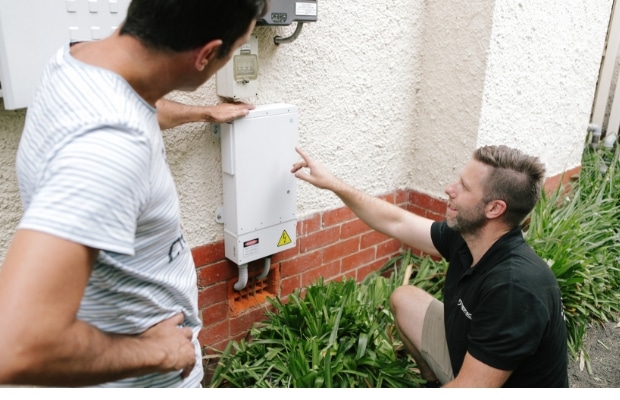The ABC’s 7:30 Report last night investigated a growing concern that Australian homes are being fed electricity with unnecessarily high grid voltage. This can mean increasing power bills as appliances use the extra energy.
The report pointed out that by regulation, Australian households should get electricity with a grid voltage between 216 and 253 volts.
However, the voltage is often at the upper end and sometimes over the 253 volt limit, which can mean more electricity consumption.
7:30 Report: High grid voltage readings ‘outrageous’
Electrician Dean Spicer described some household voltage readings as “outrageous”.

“Once an appliance reaches saturation, that high voltage transfers as heat, which is just money down the drain, effectively,” he said.
Richard McIndoe spent years running one of the country’s major electricity retailers, EnergyAustralia. McIndoe is now head of Edge Electrons, the electronics firm behind the EdgeIQ voltage regulator.
Speaking to the 7:30 Report he said he said he was being “force fed” electricity.
“Based on the voltage that I’m seeing here at 254 volts, I’m roughly paying about $1,200 more for my electricity each year than I need to,” McIndoe said.
“This is pervasive across the whole country. We have a major issue with regulating voltage across Australia and it’s getting worse.”
EdgeIQ voltage regulator curbs high grid voltage
The EdgeIQ acts as a buffer between the home and high voltages, maintain a constant, reliable voltage to the home.
According to Edge Electronics, this can save up to 10 per cent on power bills while extending the life of appliances.
EdgeIQ inventor Neal Stewart has previously spoken to Energy Matters about the EdgeIQ and the problems of high voltage.
“The EdgeIQ is a voltage regulation device for houses,” he said. “It’s really useful for homes with solar PV systems. It uses power electronics and software in a device attached to the house that stabilises the grid voltage. We literally separate the house from the grid, and there’s no other technology out there that does that.
“When we put the EdgeIQ on the house, we can process the power so that we aren’t concerned about the fluctuations on the input. The consumer is fully protected, because high voltages damage appliances.”
Snapshot of electricity meters across Australia
7:30 Report journalist Liz Hobday said Australia’s underlying voltages are high, and also affected by wind and solar power.
She said the ABC asked two companies to take a snapshot of electricity meters across most of Australia.
The first took readings from more than 12,000 sites. They found in the middle of the day, that the average was almost 246 volts.
The lowest readings were taken at night, when solar panels aren’t working. They were still almost 242 volts, at the upper end of the range.
High grid voltage – an expensive problem to fix
“At the heart of the debate is this – Australia has almost two million solar panels delivering extra voltage to the grid,” Hobday said.
“The poles and wires companies say therefore solar is responsible for boosting voltage on a broad scale. But the underlying problem is the networks are already delivering voltage that is at the top end of the range, regardless of solar. That is an expensive problem to fix.”
However, Andrew Dillon, CEO of Energy Networks Australia, told the 7:30 Report that sustained voltages at a higher level would have a minimal effect on power bills.
“When you have high voltages coming through the system on a sustained basis, it does have an effect on appliances – as does when you have low voltages coming through the system too often, that also has an effect on electrical appliances.”
The report concluded that households need a clearer idea of how much voltage they are using.
Our professional solar installers in Melbourne will assess and determine your energy needs. We customise a solar panel system in Melbourne to fit the roof size of your property, ensuring you receive the most suitable solar panel system for your Melbourne home, meeting to property’s energy requirements.












































